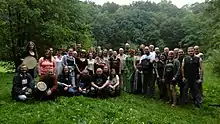Slavic Native Faith in Poland
Slavic Native Faith in Poland (Rodnovery; Polish: Rodzimowierstwo) has in 2007, according to Scott Simpson, between 2000 and 2500 "actively engaged and regular participants".[1] In 2020, Konrad Kośnik and Elżbieta Hornowska estimated that Rodnovers in Poland were between 7000 and 10,000.[2]
| Part of a series on |
| Slavic Native Faith |
|---|
 |
History
In 1818, the Polish folklorist and Slavophile Zorian Dołęga-Chodakowski (pseudonym of Adam Czarnocki; 1784–1825) stated that Poland "must return to [the] native faith". According to that, he's recognised as precursor of the Slavic Native Faith in Poland.[3] Another precursor in Poland was Jan Sas Zubrzycki (1860–1935), who elaborated the doctrine of "God-Knowing" (Bogoznawstwo).[4]
In the interwar period, a few movements emerged in Poland, recognized as early Polish Slavic Native Faith followers: the Święte Koło Czcicieli Światowida ("Holy Circle of Worshippers of Svetovid"; 1921) of Władysław Kołodziej (1897–1978), Demiurg (1934), and Zadrugism (1937) of Jan Stachniuk (1905–1963).[5] Another example is the pilot and army officer Zdzisław Harlender (1898–1939), who advocated Polish Native Faith in his book Czciciele Dadźbóg Swarożyca ("Worshipers of Dadźbóg Swarożyc", 1937).[6]
The rapper and music producer Donatan is a self-declared adherent of Slavic Native Faith.[7] He released his debut album Równonoc (English: Equinox) in 2012 and is a prolific music producer in Poland; he produced the song "My Słowianie (We Are Slavic)" which represented Poland at the Eurovision Song Contest 2014.[8]
Demographics
In 2013, Simpson noted that Slavic Native Faith remains a "very small religion" in Poland, which is otherwise dominated by Roman Catholicism.[9] He suggested that there were under 900 regularly active members of the main four registered Polish Native Faith organisations,[10] and around as many adherents belonging to smaller, unregistered groups.[11]
In 2017, he stated that between 2000 and 2500 "actively engaged and regular participants" were likely active in the country.[1] In 2020, Konrad Kośnik and Elżbieta Hornowska estimated between 7000 and 10,000 Rodnovers in Poland.[2]
Simpson observed that in the country, Slavic Native Faith's adherents were "still relatively young",[12] and saw an overlap with the community of historical re-enactors.[11] Kosnik and Hornowska observed that despite being young, Polish Rodnovers were spiritually mature and had joined the religion as it satisfied deep personal needs.[13] They also observed that males constituted the majority of the community.[13]
Rodnover organisations in Poland

The major organisation of Rodnovery in Poland is the Rodnover Confederation.
There are five formally registered religious organisations:
- Native Polish Church;
- Polish Slavic Church;
- Religious Organisation of Polish Rodnovers "Rod";[14]
- Rodzima Wiara ("Native Faith");
- West-Slavic Religious Organization "Slavic Faith".
References
Citations
- Simpson 2017, p. 82.
- Kośnik & Hornowska 2020, p. 74.
- Simpson 2000, pp. 50-51.
- Simpson & Filip 2013, p. 28.
- Simpson 2000, pp. 67-80.
- Simpson 2012, p. 11.
- Simpson 2017, p. 77.
- BBC 2014.
- Simpson 2013, p. 120.
- Simpson 2013, p. 115.
- Simpson 2013, p. 118.
- Simpson 2013, p. 119.
- Kośnik & Hornowska 2020, p. 91.
- "Powołanie nowego związku wyznaniowego" [Creation of a new religious association]. Duchtynia (in Polish). 13 June 2017. Archived from the original on 27 June 2017.
Sources
- BBC Online (2014). "Eurovision Song Contest - Songs 2014: Poland".
- Kośnik, Konrad; Hornowska, Elzbieta (2020). "A Preliminary Quantitative Study of the Mysticism and Religious Maturity of Contemporary Slavic Neopagans in Poland". Religio: revue pro religionistiku. 28 (1): 73–93. doi:10.5817/Rel2020-1-6. ISSN 1210-3640.
- Simpson, Scott (2000). Native Faith. Polish Neo-Paganism at the Brink of the 21st Century. Religiologica Juventa. Kraków: Zakład Wydawniczy Nomos. ISBN 8388508075.
- Simpson, Scott (2012). "Strategies for Constructing Religious Practice in Polish Rodzimowierstwo". In Anczyk, A.; Grzymała-Moszczyńska, H. (eds.). Walking the Old Ways: Studies in Contemporary European Paganism. Katowice: Sacrum.
- Simpson, Scott (2013). "Polish Rodzimowierstwo: Strategies for (Re)constructing a Movement". In Kaarina Aitamurto; Scott Simpson (eds.). Modern Pagan and Native Faith Movements in Central and Eastern Europe. Durham: Acumen. pp. 112–127. ISBN 9781844656622.
- Simpson, Scott (2017). "Only Slavic Gods: Nativeness in Polish Rodzimowierstwo". In Kathryn Rountree (ed.). Cosmopolitanism, Nationalism, and Modern Paganism. New York: Palgrave Macmillan. pp. 65–86. ISBN 9781137570406.
- Simpson, Scott; Filip, Mariusz (2013). "Selected Words for Modern Pagan and Native Faith Movements in Central and Eastern Europe". In Kaarina Aitamurto; Scott Simpson (eds.). Modern Pagan and Native Faith Movements in Central and Eastern Europe. Durham: Acumen. pp. 27–43. ISBN 9781844656622.
Further reading
- Schaab, Philipp (2019). Götter, Ahnen, Blut und Boden? Die Konstruktion ethnischer Identität im gegenwärtigen slawischen Neuheidentum in Polen. Religionen in der pluralen Welt (in German). 18. Berlin: Lit Verlag. ISBN 9783643145123.